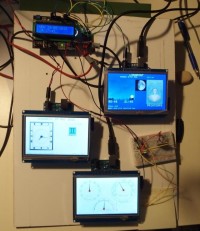Astronomic clock

Astronomic clock. It is a big word, but it give the same informations of old church astronomic clock. much more precise It use 3 TFT dispaly of 5" and one 2 line lcd. 3 arduino 2560 + 1 arduino uno + 1 Attiny45 FIRST TFT DISPLAY the first screen shows a world map on which the Sun moves.
Astronomic clock. It is a big word, but it give the same informations of old church astronomic clock. much more precise It use 3 TFT dispaly of 5" and one 2 line lcd. 3 arduino 2560 + 1 arduino uno + 1 Attiny45 FIRST TFT DISPLAY the first screen shows a world map on which the Sun moves. The picture is stored in a Sd card the areas of perpetual nights are indicated and variables depending on the lighting of the Earth. After 3 minutes or when one touches the surface of the screen, a clock display appears. (Left first display) to the right of it indicates Greenwich time, the current zodiac sign and where applicable the anniversaries of relatives. These are stored in a file created by a VBA application in a table Excel (SD card) SECOND TFT DISPLAY the second screen shows: First window: the apparent path of the Sun from East to West. with indication of sunrise and sunset. When the Sun is down, the window shows a starry sky. Under this window are indicated the number of the day of the year and the variation in duration compared to the day before. These indications are calculated from the latitude and longitude of the location of the clock. These data are included in a file in the SD card. the city is listed in title, the date and time are taken. Second window: the phases of moon. Third window: an allegory representing the current season. THIRD TFT DISPLAY The third screen shows three analog dials relative humidity, temperature, and atmospheric pressure the values are also included in digital windows as well as a representation of changes in pressure on 5 days. THE MASTER CLOCK (A) Un module master clock consisting of an Arduino UNO + a display lcd 2lignes Dfrobot module and a RTC(real time clock) DS3234 TCXO module i.e. very high accuracy: +/-2 ppm drift announced annually. I have other better images but no room here to put PDF file.



Discussion (0 commentaire(s))